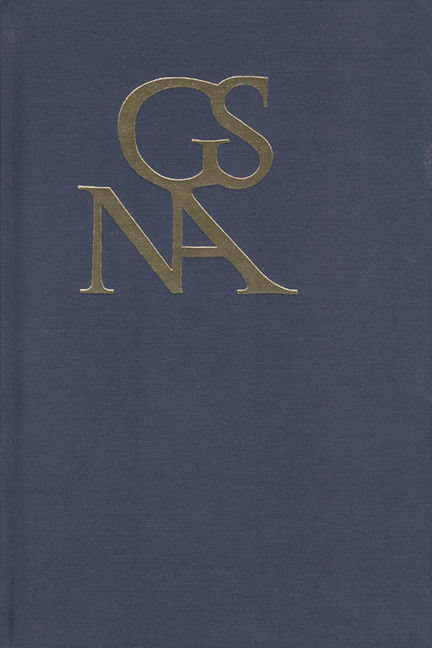Book contents
- Frontmatter
- Contents
- Reorientations around Goethe
- Reorientations around Goethe II
- Special Section on Goethe's Narrative Events edited by Fritz Breithaupt
- What Is an Event for Goethe?
- Much Ado about Nothing? The Absence of Events in Die Wahlverwandtschaften
- Countering Catastrophe: Goethe's Novelle in the Aftershock of Heinrich von Kleist
- Narrating (against) the Uncanny: Goethe's “Ballade” versus Hoffmann's Der Sandmann
- Remembering Klopstock's Mitausdruck
- Strategic Indecision: Gender and Bureaucracy in Schiller's Maria Stuart
- The Dark Green in the Early Anthropocene: Goethe's Plants in Versuch die Metamorphose der Pflanzen zu erklären and Triumph der Empfindsamkeit
- Abschlussbewegungen: Goethe, Freud, and Spectral Forms of Life
- Ein Mythos und sein doppelter Entzug des Modernen: Prämissen für einen Ausweg aus der Unübersichtlichkeit der Faustforschung
- Johann Wolfgang von Goethe in Conversation with Things
- World Literature Turns Political, 1835/36: The Early Afterlife of Goethe's Pronouncement in German Cultural-Politics and in the Young Germany Movement
- Fritz Strich and the Dilemmas of World Literature Today
- A Jewish Faust Commentary: Notes on Franz Rosenzweig's The Star of Redemption
- From Idylle to idílio: Mário de Andrade's Parody of Hermann und Dorothea
- Koselleck's Timely Goethe?
- Book Reviews
Remembering Klopstock's Mitausdruck
from Special Section on Goethe's Narrative Events edited by Fritz Breithaupt
Published online by Cambridge University Press: 26 June 2019
- Frontmatter
- Contents
- Reorientations around Goethe
- Reorientations around Goethe II
- Special Section on Goethe's Narrative Events edited by Fritz Breithaupt
- What Is an Event for Goethe?
- Much Ado about Nothing? The Absence of Events in Die Wahlverwandtschaften
- Countering Catastrophe: Goethe's Novelle in the Aftershock of Heinrich von Kleist
- Narrating (against) the Uncanny: Goethe's “Ballade” versus Hoffmann's Der Sandmann
- Remembering Klopstock's Mitausdruck
- Strategic Indecision: Gender and Bureaucracy in Schiller's Maria Stuart
- The Dark Green in the Early Anthropocene: Goethe's Plants in Versuch die Metamorphose der Pflanzen zu erklären and Triumph der Empfindsamkeit
- Abschlussbewegungen: Goethe, Freud, and Spectral Forms of Life
- Ein Mythos und sein doppelter Entzug des Modernen: Prämissen für einen Ausweg aus der Unübersichtlichkeit der Faustforschung
- Johann Wolfgang von Goethe in Conversation with Things
- World Literature Turns Political, 1835/36: The Early Afterlife of Goethe's Pronouncement in German Cultural-Politics and in the Young Germany Movement
- Fritz Strich and the Dilemmas of World Literature Today
- A Jewish Faust Commentary: Notes on Franz Rosenzweig's The Star of Redemption
- From Idylle to idílio: Mário de Andrade's Parody of Hermann und Dorothea
- Koselleck's Timely Goethe?
- Book Reviews
Summary
“Wer kennt ihn heute?”
JULY, 1805: The Edinburgh Review, one of the most influential magazines of political and literary criticism in nineteenth-century Great Britain, published a review of An Inquiry into the Principles of Harmony in Language (1804), a book on modern and classical versification written by William Mitford. Mitford, an historian of Ancient Greece whom Lord Byron once called “perhaps the best of all modern historians whatsoever,” had published a first edition of the book anonymously in 1774. By 1804, Mitford's Inquiry had become a comprehensive treatise on the mechanics of poetic meter. His long-standing interest in the relationship between poetry and music led him to advocate for the organization of verse based on tonality (that is, musical pitch produced by accents or stresses) rather than quantification (counting the number of syllables by measuring their length). While the mechanics of Greek and Latin offer clear rules regarding the harmony of poetic language, Mitford wrote, “for the very different harmony of English verse no rule could be obtained.” His championing of spoken English as a poetic language for “the cause of English letters” (Mitford n.p.) was, in this way, a contribution to one of the most debated questions of English prosody at the time: should English poets measure their verse by sound or by syllable?
The author of the review was William Herbert, a botanist, politician, scholar of poetry, politician, and clergyman. Best known for his work on hybridization and the evolution of bulbous plants, Herbert also cultivated a keen interest in poetry. He had just published a curious Greek translation of Ossian's Latin poem “Darthula” in 1801, followed by a selection of Icelandic and old Scandinavian poetry in English translation. In his lengthy review of Mitford's book, Herbert passionately contested Mitford's argument that Latin verse is “regulated solely by certain dispositions of quantities,” arguing that it ignores the importance of accents as a means of regulating classical meter. This was the starting point of Herbert's somewhat bitter general assessment of modern verse, especially of the kind written by poets who confuse accent and quantity and as a result produce “faulty” poetry.
Among the worst offenders of such verse, Herbert wrote, was Friedrich Gottlieb Klopstock. “Klopstock, whose reputation is perhaps undeservedly great,” Herbert wrote, “has prefixed to his Messiah a treatise upon that disgusting abortion, which is called the German hexameter.”
- Type
- Chapter
- Information
- Goethe Yearbook 26Publications of the Goethe Society of North America, pp. 101 - 122Publisher: Boydell & BrewerPrint publication year: 2019



